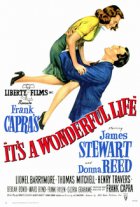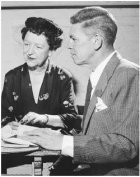
It's a Wonderful Life Page #13
- PG
- Year:
- 1946
- 130 min
- 2,444 Views
As George speaks, sirens are heard passing in the street below.
The crowd turn to the windows, then back to George.
GEORGE (cont'd)
I have some news for you, folks. I've just talked to old man
Potter, and he's guaranteed cash payments at the bank. The bank's
going to
reopen next week.
ED:
But, George, I got my money here.
CHARLIE:
Did he guarantee this place?
GEORGE:
Well, no, Charlie. I didn't even ask him. We don't need Potter
over here.
Mary and Ernie have come into the room during this scene. Mary
stands watching silently.
CHARLIE:
I'll take mine now.
GEORGE:
No, but you . . . you . . . you're thinking of this place all
wrong. As if I had the money back in a safe. The money's not
here. Your money's in Joe's
house . . .
(to one of the men)
. . . right next to yours. And in the Kennedy house, and Mrs.
Macklin's house, and a hundred others. Why, you're lending them
the money to build, and then, they're
going to pay it back to you as best they can. Now what are you
going to do? Foreclose on them?
TOM:
I got two hundred and forty-two dollars in here, and two hundred
and forty-two dollars isn't going to break anybody.
MEDIUM CLOSE SHOT �� ANOTHER ANGLE
GEORGE (handing him a slip)
Okay, Tom. All right. Here you are. You sign this. You'll get
your money in sixty days.
TOM:
Sixty days?
GEORGE:
Well, now that's what you agreed to when you bought your shares.
There is a commotion at the outer doors. A man (Randall) comes in
and makes his way up to Tom.
RANDALL:
Tom . . . Tom, did you get your money?
TOM:
No.
RANDALL:
Well, I did. Old man Potter'll pay fifty cents on the dollar for
every share you got.
(shows bills)
CROWD (ad lib)
Fifty cents on the dollar!
RANDALL:
Yes, cash!
TOM (to George)
Well, what do you say?
GEORGE:
Now, Tom, you have to stick to your original agreement. Now give
us sixty days on this.
TOM (turning to Randall)
Okay, Randall.
He starts out.
MRS. THOMPSON
Are you going to go to Potter's?
TOM:
Better to get half than nothing.
A few other people start for the door. CAMERA PANS WITH George as
he vaults over the counter quickly, speaking to the people.
GEORGE:
Tom! Tom! Randall! Now wait . . . now listen . . . now listen to
me. I beg of you not to do this thing. If Potter gets hold of
this Building and Loan there'll
never be another decent house built in this town. He's already
got charge of the bank. He's got the bus line. He's got the
department stores. And now he's after us.
Why? Well, it's very simple. Because we're cutting in on his
business, that's why. And because he wants to keep you living in
his slums and paying the kind of rent he
decides.
The people are still trying to get out, but some of them have
stood still, listening to him. George has begun to make an
impression on them.
GEORGE (cont'd)
Joe, you lived in one of his houses, didn't you? Well, have you
forgotten? Have you forgotten what he charged you for that
broken-down
shack?
(to Ed)
Here, Ed. You know, you remember last year when things weren't
going so well, and you couldn't make your payments. You didn't
lose your house, did you? Do
you think Potter would have let you keep it?
(turns to address the room again)
Can't you understand what's happening here? Don't you see what's
happening? Potter isn't selling. Potter's buying! And why?
Because we're panicky and he's not.
That's why. He's picking up some bargains. Now, we can get
through this thing all right. We've got to stick together,
though. We've got to have faith in each other.
MRS. THOMPSON
But my husband hasn't worked in over a year, and I need money.
WOMAN:
How am I going to live until the bank opens?
MAN:
I got doctor bills to pay.
MAN:
I need cash.
MAN:
Can't feed my kids on faith.
During this scene Mary has come up behind the counter. Suddenly,
as the people once more start moving toward the door, she holds
up a roll of bills and
calls out:
MARY:
How much do you need?
George jumps over the counter and takes the money from Mary.
GEORGE:
Hey! I got two thousand dollars! Here's two thousand dollars.
This'll tide us over until the bank reopen.
(to Tom)
All right, Tom, how much do you need?
TOM (doggedly)
Two hundred and forty-two dollars!
GEORGE (pleading)
Aw, Tom, just enough to tide you over till the bank reopens.
TOM:
I'll take two hundred and forty-two dollars.
George starts rapidly to count out the money. Tom throws his
passbook on the counter.
GEORGE:
There you are.
TOM:
That'll close my account.
GEORGE:
Your account's still here. That's a loan.
Mary turns and slips out through the crowd, followed by Ernie.
George hands the two hundred and forty-two dollars to Tom, and
speaks to Ed, the next
in line.
GEORGE (cont'd)
Okay. All right, Ed?
ED:
I got three hundred dollars here, George.
Uncle Billy takes out his wallet and takes out all the cash he's
got.
GEORGE:
Aw, now, Ed . . . what'll it take till the bank reopens? What do
you need?
ED:
Well, I suppose twenty dollars.
GEORGE:
Twenty dollars. Now you're talking. Fine. Thanks, Ed.
(to Mrs. Thompson, next in line)
All right, now, Mrs. Thompson. How much do you want?
MRS. THOMPSON
But it's your own money, George.
GEORGE:
Never mind about that. How much do you want?
MRS. THOMPSON
I can get along with twenty, all right.
GEORGE (counting it out)
Twenty dollars.
MRS. THOMPSON
And I'll sign a paper.
GEORGE:
You don't have to sign anything. I know you'll pay it back when
you can. That's okay.
(to woman next in line)
All right, Mrs. Davis.
MRS. DAVIS
Could I have seventeen-fifty?
GEORGE:
Seven . . .
(he kisses her)
Bless your heart, Of course you can have it. You got fifty cents?
(counting)
Seven . . .
WIPE TO:
INTERIOR OUTER OFFICE BUILDING AND LOAN �� NIGHT
CLOSE SHOT �� George, Uncle Billy and Cousin Tilly are behind the
counter, watching the minute hand of a clock on the wall as
George counts off the
seconds. Cousin Eustace is ready to close the door.
UNCLE BILLY (excitedly)
We're going to make it, George. They'll never close us up today!
GEORGE (counting)
Six . . . five . . . four . . . three . . . two . . . one . . .
Bingo!
Cousin Eustace slams and locks the door, and scurries around the
counter to join the others.
GEORGE (cont'd)
We made it! Look . . .
(holds up two bills)
. . . look, we're still in business! We've still got two bucks
left!
Uncle Billy is taking a drink out of his bottle.
GEORGE (cont'd)
Well, let's have some of that. Get some glasses, Cousin Tilly.
(to Uncle Billy)
We're a couple of financial wizards.
UNCLE BILLY:
Those Rockefellers!
GEORGE:
Get a tray for these great big important simoleons.
UNCLE BILLY:
We'll save them for seed. A toast!
They raise their glasses.
GEORGE:
A toast! A toast to Papa Dollar and to Mama Dollar, and if you
want the old Building and Loan to stay in business, you better
have a family real quick.
COUSIN TILLY:
I wish they were rabbits.
Translation
Translate and read this script in other languages:
Select another language:
- - Select -
- 简体中文 (Chinese - Simplified)
- 繁體中文 (Chinese - Traditional)
- Español (Spanish)
- Esperanto (Esperanto)
- 日本語 (Japanese)
- Português (Portuguese)
- Deutsch (German)
- العربية (Arabic)
- Français (French)
- Русский (Russian)
- ಕನ್ನಡ (Kannada)
- 한국어 (Korean)
- עברית (Hebrew)
- Gaeilge (Irish)
- Українська (Ukrainian)
- اردو (Urdu)
- Magyar (Hungarian)
- मानक हिन्दी (Hindi)
- Indonesia (Indonesian)
- Italiano (Italian)
- தமிழ் (Tamil)
- Türkçe (Turkish)
- తెలుగు (Telugu)
- ภาษาไทย (Thai)
- Tiếng Việt (Vietnamese)
- Čeština (Czech)
- Polski (Polish)
- Bahasa Indonesia (Indonesian)
- Românește (Romanian)
- Nederlands (Dutch)
- Ελληνικά (Greek)
- Latinum (Latin)
- Svenska (Swedish)
- Dansk (Danish)
- Suomi (Finnish)
- فارسی (Persian)
- ייִדיש (Yiddish)
- հայերեն (Armenian)
- Norsk (Norwegian)
- English (English)
Citation
Use the citation below to add this screenplay to your bibliography:
Style:MLAChicagoAPA
"It's a Wonderful Life" Scripts.com. STANDS4 LLC, 2025. Web. 24 Feb. 2025. <https://www.scripts.com/script/it's_a_wonderful_life_872>.







Discuss this script with the community:
Report Comment
We're doing our best to make sure our content is useful, accurate and safe.
If by any chance you spot an inappropriate comment while navigating through our website please use this form to let us know, and we'll take care of it shortly.
Attachment
You need to be logged in to favorite.
Log In